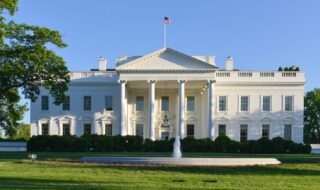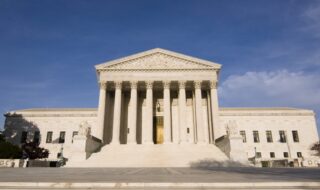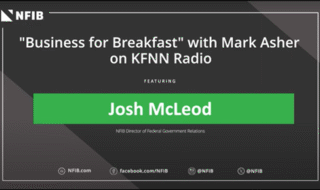January 24, 2020 Last Edit: March 4, 2025
NFIB Calls for B&O, Occupational Licensing Reforms
State Director Patrick Connor reports from Olympia on the small-business agenda for the legislative week ending January 24.
Week 2 of the 2020 session of the Washington State Legislature has come to an end. Here’s an overview.
Small Business Bill of Rights
Senate Bill 6408, concerning agency responsibilities to regulated businesses and professions, will be heard Tuesday, January 28, in the Senate Financial Institutions, Economic Development & Trade Committee. Its companion, House Bill 2577, will be heard next Friday in the House State Government & Tribal Relations Committee.
NFIB has continued working with the Gov. Jay Inslee’s office to address last-minute changes requested by a few state agencies. Most are simply wording changes or clarifications of items on which agreement had already been reached.
Health Care
- House Health Care & Wellness Committee Chairwoman Rep. Eileen Cody asked NFIB to testify in support of her HB 2457, creating a health care transparency board. The bill is a logical next step in NFIB’s ongoing support of providing consumers with greater health care cost and quality data. The new panel would consist of public- and private-sector health insurance purchasers who would establish benchmarks for future health care cost increases, and track expenditures against the annual benchmark. The board has no regulatory authority. Testimony on the bill was almost entirely from groups seeking to be added to the board or one of its advisory committees. A seat on the board is already reserved for small business.
- NFIB supported SB 6097, requiring the insurance commissioner to review a health insurer’s surplus levels as part of its rate filing review process. The state’s three non-profit health insurers have amassed more than $4 billion in excess surplus – cash balances beyond those needed to pay the future cost of claims or other statutorily required reserves. NFIB has supported similar measures in the past, based on our 2015 state member ballot.
Labor
- NFIB opposed HB 2409, increasing industrial insurance employer penalties and duties, and restricting licensing of third-party administrators.
- We also opposed HB 2564, which would require OSHA-10 health and safety training for every construction worker in the state, as well as mandating supervisors take OSHA-30 training. Construction industry groups estimate the OSHA-10 requirement could cost $500 each for every one of the state’s more than 200,000 construction workers.
- Negotiations continued on HB 2399, restricting employer searches of worker vehicles on company property. NFIB believed it had reached an agreement with the woodworkers’ union last week. Unfortunately, the language prepared by the union was not a correct representation of that agreement. We met again today, and again believe we have reached agreement on the same terms as before. The bill is on hold in the House Labor & Workplace Standards Committee pending agreement of the parties.
- The House labor committee approved HB 2308, requiring employers to periodically report standard occupational classifications or job titles of workers, despite NFIB’s objections. We are continuing to work with the state workforce board and the Employment Security Department to address our members’ concerns.
Tax & Fiscal
- NFIB testified “other” on SB 6492, amending last year’s B&O tax surcharge legislation (HB 2158). SB 6492 would expand the 1.8% B&O tax rate to all firms with more than $1 million in gross receipts from service activities. It would raise the small business tax credit to $100,000 for service businesses and $150,000 for other classifications. NFIB supports those provisions. However, it would also eliminate the 2% and 2.5% tax rate for advanced computing businesses grossing more than $25 billion or $100 billion worldwide (yes, BILLION), respectively. Since the bill would capture 4,400 more services businesses than before, NFIB testified it is essential to determine whether advanced computing businesses – who called for last year’s tax hike – pay at least as much tax under this bill as they were expected to pay under HB 2158. NFIB has requested this data from the Department of Revenue.
- NFIB opposed one of the House bills also seeking to amend 2019’s HB 2158. HB 2468 would replace the 2% and 2.5% B&O tax rates for advanced computing businesses with a 1.22% tax rate, and expand the 1.8% rate to more service businesses. This bill has none of the thresholds or small business tax credit increases contained in SB 6492.
Regulatory
NFIB testified in favor of a package of four bills addressing professional licensing:
- HB 2354 would allow the Department of Licensing (DOL) to expedite license applications from new residents already licensed in states with substantially similar requirements as Washington’s.
- HB 2355 would permit competency examinations in lieu of the state’s training requirements for some occupational licenses.
- HB 2357 would require DOL to review all existing licensing boards, commissions, and requirements over a five-year period, and report any recommended changes to the Legislature.
- HB 2477 would require that future occupational license requirements be based on protecting the public interest, such as health and safety, and not simply be enacted to limit entrance into a profession.
Small Business Day 2020
NFIB members can register here for Small Business Day 2020, which will be held February 4 at Olympia’s new Hilton Garden Inn. Ask for the NFIB room block when booking your stay.
The event will feature:
- Senate Republican Leader Mark Schoesler
- House Republican Leader JT Wilcox
- Tax Structure Workgroup Co-chairwoman Rep. Noel Frame
- Former Rep. Mark Harmsworth, who is the new director of the Washington Policy Center’s Small Business Center
- Staff from the Workforce Training and Education Coordinating Board and/or Employment Security Department (ESD)
Previous Reports and News Releases
January 17 Report—Agreement Reached to Protect Small Businesses During Inspections
NFIB is a member-driven organization advocating on behalf of small and independent businesses nationwide.
Related Articles
















